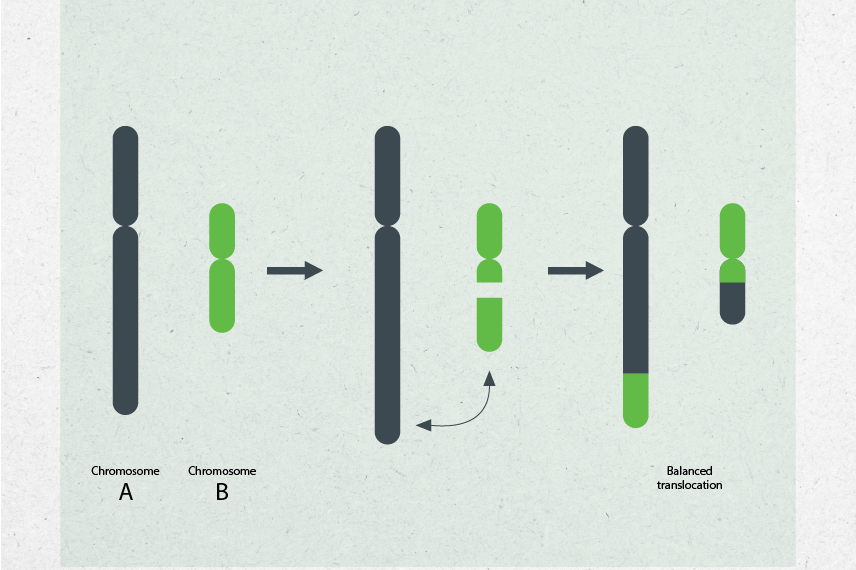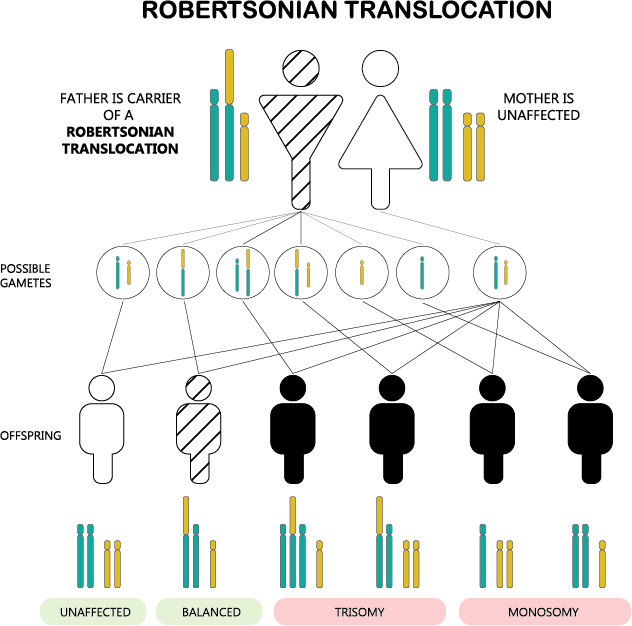PGT-S – preimplantation genetic testing of structural chromosomal defects
One of the inherited causes of infertility or recurrent miscarriage is the presence of chromosomal abnormalities in either parent, which is defined by the term chromosomal structural rearrangements. This is a large group of disorders with a common denominator characterized by disintegration (breaking) of the genetic information which is subsequently rearranged either within one chromosome or between two chromosomes. Such structural chromosomal changes include deletions (a part of a chromosome is missing), insertions (part of a chromosome is inserted into another chromosome where it does not belong), duplication (a part of a chromosome is duplicated), a ring chromosome (the ends of the chromosome are joined thus forming a ring shape), inversion (a part of the genetic information within one chromosome is reversed in the opposite direction) and translocations (exchange of genetic information between chromosomes).
Sometimes these chromosomal abnormalities are very small and it is very difficult to predict their impact on the health of the future child. Geneticists are not always able to determine how important are the genes located at the break site and what impact this may have in the future. A newborn baby can generally be either completely healthy or have the disorder with the identical balancing as his or her parent, which does not affect the child in any way. However, in a certain percentage of cases, the defect may be unbalanced, which can manifest itself in various health problems. When the chromosome break occurs at the site of important genes that are essential for the healthy development of pregnancy, such pregnancies usually end in early miscarriage. In specific cases, prenatal diagnostics may identify such a disorder as a congenital developmental disorder in the fetus.
In practice, the most common type is the so-called balanced translocation. In this case, one part of the genetic information is exchanged between two chromosomes. Individuals carrying this defect do not show any signs of genetic disease because ultimately, the number of their genes is correct.
The problem arises when the genetic information is to be distributed into an egg or a sperm. Both the egg and the sperm have only half the number of chromosomes compared to other cells in the body – 22 autosomes and one gonosome. At the stage when chromosomes are divided in the process of maturing of an egg or sperm, it may happen that the sex cell will have some genes duplicated while others may be missing. If an embryo develops from this sex cell, its genetic information is no longer balanced, and the embryo is either unable to implant in the uterus or the pregnancy ends in miscarriage. Alternatively, severe fetal developmental abnormalities may occur.
If one of the parents is a carrier of a balanced chromosomal abnormality or other severe structural chromosomal rearrangement, genetic testing of embryos is indicated in such a couple precisely in order to prevent the transfer of genetically unbalanced embryos into the uterus.
In addition to the ruling out of unbalanced chromosomal rearrangements, embryo aneuploidies are also assessed in this case so that to maximize the chances of a healthy pregnancy.

